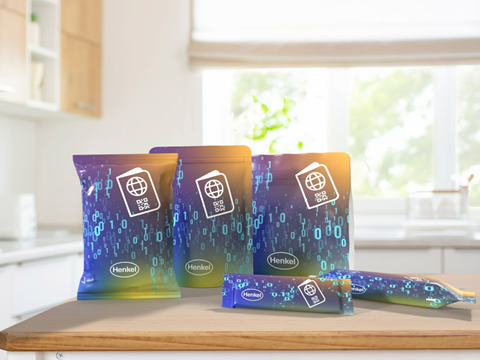
Aiming to address the challenges of consumer demand for sustainable solutions and stricter regulations requiring greater resource efficiency in production, Henkel, R-Cycle and Korozo Group have collaborated to investigate the potential benefits of Digital Product Passports (DPPs).
The DPP contains information such as the material composition, technical specifications and recyclability of a product. Each product is allocated a unique identifier, accessible via a marking such as a QR code or RFID tag, to be traced along the value chain.
Together with Korozo Group and R-Cycle, Henkel tested and implemented the DPP into its Loctite Liofol solvent free adhesive used to laminate stand-up pouches, said to have chemical and thermal resistance and be suitable for aggressive filling goods, pasteurization and high-speed packaging lines with a high seal temperature.
Each package produced with Loctite Liofol is given a QR code linked with the R-Cycle DPP. Apparently, this ensures that technical data, safety information and environmental aspects can be accessed directly. Henkel is working with R-Cycle to extend this traceability, seeking to optimize the disposal and recyclability of the product.
Last July PicoNext revealed it had designed a generative artificial intelligence capability for its Digital Product Passport (DPP) platform, designed to analyze and summarize raw product data into sustainability metrics to lower the time and costs spent publishing DPPs. PicoNext said its AI Assistant takes on raw, unstructured product data which can then be used to automatically summarize the sustainability metrics in a DPP template, in line with regulatory standards.
More recently Daniel Sabin Diaz, global senior solutions consultant at Systech, outlined how DPPs will affect data carrier printing, data exchange and stakeholder responsibilities. Diaz noted that the European Commission is expected to outline specific requirements, standards, and Digital Product Passport (DPP) content through the ESPR working plan, poised to affect nearly all industries except food and pharmaceutical products, which are governed by their own regulatory frameworks.
If you liked this story, you might also enjoy:
The ultimate guide to the Packaging and Packaging Waste Regulation in 2024
How are the top brands progressing on packaging sustainability?
Sustainable Innovation Report 2024: Current trends and future priorities
Everything you need to know about global plastic sustainability regulation












No comments yet